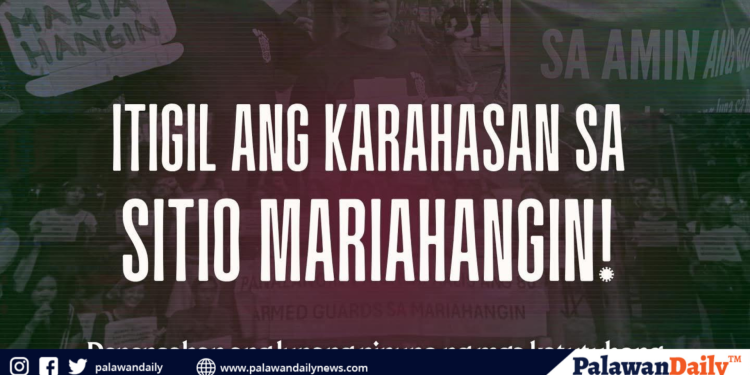An Indigenous community in southern Palawan, a globally recognized biodiversity hotspot, is facing heightened threats of displacement and violence amid the aggressive entry of private security forces allegedly linked to a subsidiary of one of the Philippines’ largest conglomerates, San Miguel Corporation (SMC).
On April 4, nearly 100 armed security personnel reportedly arrived on Sitio Mariahangin, Barangay Bugsuk, home to the Molbog Indigenous people, to begin the demolition of homes in preparation for a large-scale eco-tourism development project spearheaded by Bricktree Properties Inc., a firm tied to SMC.
Local civil society and Indigenous rights groups, including Kalikasan Timog Katagalugan and SALINLAHI Alliance for Children’s Concerns, have raised the alarm, accusing the company of intimidation tactics, including unauthorized demolitions, restriction of community movement, and harassment involving warning shots and surveillance patrolsaround the island.
“This is not development, it’s displacement,” Kalikasan said in a statement, emphasizing that such projects exploit environmental branding while violating human rights and Indigenous land protections.
The Molbog community has lived in the region for generations and filed for formal recognition of their ancestral domain in 2005, covering more than 56,000 hectares of land and marine territory. Despite this, their Certificate of Ancestral Domain Title (CADT) remains pending with the National Commission on Indigenous Peoples (NCIP), a legal limbo that has left them vulnerable to land grabs.
In contrast, Bricktree Properties claims legal ownership over at least 7,000 hectares on the island, citing land titles issued as early as 1974, though these titles remain contested and are now a flashpoint of legal and political tension.
Palawan is home to critical habitats including coral reefs, freshwater springs, mangrove forests, and endemic species. According to Kalikasan, the scale and infrastructure required for a luxury tourism estate will likely damage fragile ecosystems and severely limit the Molbog people’s access to their own land and sea resources.
“We are witnessing the greenwashing of corporate land seizures,” one human rights group noted. “These projects are often presented as ecologically friendly, but on the ground, they come at the cost of Indigenous livelihoods, cultural survival, and environmental integrity.”
Human rights advocates are calling on the United Nations Permanent Forum on Indigenous Issues, the UN Special Rapporteur on the Rights of Indigenous Peoples, and international donors involved in environmental and Indigenous programs in the Philippines to closely monitor the situation.
The case also raises concerns for development partners funding eco-tourism or conservation projects in Palawan and similar regions. Without safeguards, experts warn that such initiatives may unwittingly support human rights abuses and the dispossession of Indigenous peoples.
* Stronger government accountability and adherence to international obligations on Indigenous peoples’ rights and environmental protection





















